Admission Events – 2019
For Seminar:
| S.No | Date | City | Distance |
| 1 | 27-10-2018 | Kota | 250 Kms Approx |
| 2 | 28-10-2018 | Jaipur | |
| 3 | 03-11-2018 | Kanpur | 100 Kms Approx |
| 4 | 04-11-2018 | Lucknow | |
| 5 | 08-12-2018 | Gurgaon | 40 Kms Approx |
| 6 | 09-12-2018 | Delhi | |
| 7 | 15-12-2018 | Varanasi | 300 Kms Approx |
| 8 | 16-12-2018 | Patna | |
| 9 | 22-12-2018 | Hyderabad | 300 Kms Approx |
| 10 | 23-12-2018 | Vijayawada | |
| 11 | 29-12-2018 | Chennai | 700 Kms Approx |
| 12 | 30-12-2018 | Cochin | |
| 13 | 05-01-2019 | Bhubaneswar | 450 Kms Approx |
| 14 | 06-01-2019 | Vizag | |
| 15 | 12-01-2019 | Pune | 150 Kms Approx |
| 16 | 13-01-2019 | Mumbai | |
| 17 | 19-01-2019 | Vadodara | 120 Kms Approx |
| 18 | 20-01-2019 | Ahmedabad | |
| 19 | 02-02-2019 | Jamshedpur | 300 Kms Approx |
| 20 | 03-02-2019 | Kolkata | |
| 21 | 09-02-2019 | Nagpur | 800 Kms Approx |
| 22 | 10-02-2019 | Surat |
For Webinar:
| Date | Category | Faculty Name |
| 22-10-2018 | Choosing The Right Engineering College | Dr. Priyanka |
| 05-11-2018 | Importance of Multidisciplinary Education for Engineers | Dr. Vijaysekhar |
| 14-11-2018 | Employment & Higher studies opportunities in Engineering Education | Dr. Tousif Khan |
| 23-11-2018 | The relevance of Liberal Arts in the 21st century | Dr. Shailender |
| 04-12-2018 | Skills in Demand: Preparing Students for the High Growth Jobs of the Future | |
| 14-12-2018 | How to write your next best story in the next 10 weeks “or” A step-by-step approach to creating writing and launching your ebook in the next 90 days | |
| 26-12-2018 | 5 Coolest thing you can do as a Mechanical Engineer | |
| 02-01-2019 | The Power of Peer Groups and Posses in College Success | |
| 11-01-2019 | 5 Coolest thing you can do as an Economist | |
| 22-01-2019 | B.Tech at SRM Amaravati | |
| 01-02-2019 | Liberal Arts at SRM Amaravati | |
| 12-02-2019 | Behind the scenes look at how I launch my Business | |
| 22-02-2019 | 5 Coolest thing you can do as a Computer Science Engineer | |
| 01-03-2019 | 5 mistakes to avoid while choosing your engineering college | |
| 12-03-2019 | 5 Coolest thing you can do as a Psychologist / Journalist | |
| 22-03-2019 | College and Career Readiness: Preparing Students for 21st Century Work and Life |
- Published in Uncategorized
VC Bharucha at BUSINESSWORLD’s panel discussion on “Bridging the gap between Institution and Industry”
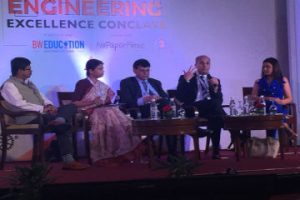 July, 2019: Jamshed Bharucha, VC of SRM AP, Amaravati was invited as a panel member in the second edition of BW Businessworld Engineering Conclave held in New Delhi. In the premise of increasing dynamism in the industry, the discussion on ” Future Skills: Are our engineers ready to adopt the global changes?” hold its own relevance.
July, 2019: Jamshed Bharucha, VC of SRM AP, Amaravati was invited as a panel member in the second edition of BW Businessworld Engineering Conclave held in New Delhi. In the premise of increasing dynamism in the industry, the discussion on ” Future Skills: Are our engineers ready to adopt the global changes?” hold its own relevance.
Bharucha expressed his concern saying, ” Most of the engineers are not working in their field. What is missing from the curriculum is skill development that would help in learning new things. We are still following a failed way of learning i.e. passive learning, where the communication is one way but in SRM, we promote active learning by involving students during the process of learning as this will facilitate the problem-solving skills”. SRM AP has active learning classrooms where regular sessions are designed with a relentless focus on improving student learning outcomes and ensuring student success in high-demand careers. Our students actively participate and engage in discussion, debates, and conversations that intrigues their interest and improves their skills. Also, for the first time in India, SRM AP introduces Collegiate Accelerator Programme presented by Minerva forum to advance the intellectual development of each student.
- Published in Uncategorized
7th August 2019: University Research Council is meeting at SRM AP Amaravati – Wednesday, August 7th 2019
The Research Council will provide the future directions for the research to be carried out by the faculty members & research scholars of SRM at Amaravati. University Research Council will be chaired by Dr. V.K. Saraswat, Hon’ble Member, NITI-AAYOG.
- Published in Uncategorized
10th and 11th August 2019: SRM AP Amaravati to host STEP (Society for Training and Employment Promotion) and Girls in Tech mentorship program
- Published in Uncategorized
Career prospects in energy storage technology
What is Energy Storage?
Ever since humans mastered energy capture, energy storage and retrieval for use at a later point of time or place has been the key pursuit in power engineering. As per Wikipedia, “Energy storage is the capture of energy produced at one time for use at a later time. A device that stores energy is generally called an accumulator or battery.”
Video Link: https://www.youtube.com/watch?v=4JGMm8qDfxw
Why is it important?
Energy comes in multiple forms, which include radiation, chemical, gravitational, electrical, temperature, and kinetic. Energy storage technology converts energy from these forms into economically storable forms that are safe and accessible.
Energy storage systems are assuming greater importance with the increasing focus on sustainable energy (solar, wind, hydro) electric vehicles and the rapid rise in use of battery-powered electronic devices like smartphones, which has led to a surge in production of lithium-ion batteries. This makes energy storage one of the most promising upcoming sectors.
Insert video: https://www.youtube.com/watch?v=ljKFr_o24jo
What are the industries involved in Energy Storage?
When one thinks of Energy Storage, one immediately thinks of batteries. However, batteries are about storage and retrieval of chemical energy, but energy is of many different types. A hydroelectric dam, stores gravitational potential energy, ice storage tanks store ice frozen by cheaper energy at night to meet peak daytime demand for cooling, and fossil fuels such as coal and gasoline store ancient energy derived from sunlight, buried and overtime and then converted into these forms. Industry applications include power storage and distribution obviously, but also automobiles, real estate, mining, and telecom.
Video Link to‘Future of Energy Storage’ https://www.youtube.com/watch?v=_LAuDTNW5dw
Video Link to ‘Beyond Batteries’: https://www.youtube.com/watch?v=3R7EzO3uBms
Who is the field relevant for?
The demand for energy storage systems is likely to grow exponentially globally as the world shifts towards renewable energy sources. This shift will mandate both grid level and unit level energy storage systems that are of viable size, cost, and energy efficiency. Significant research is currently being conducted on materials, engineering, and other optimisations.
The kind of backgrounds required for this field could include:
- Metallurgists for analysing the potential of viable materials,
- Chemical engineers and chemistry graduates,
- Electrical engineers
- Automobile engineers interested in electric vehicle development
However, energy storage is somewhat interdisciplinary, bringing together material science with expertise in energy storage using sectors.
What are the career prospects?
Estimates by Lux Research, independent research and advisory firm, suggest that the global industry for energy storage could be worth $100billion in the next few years.
Given the focus, demand, and growth, energy storage sector will generate significant jobs in the future. Moreover, due to the shortage of qualified professionals relative to demand, entry salary and salary growth prospects are positive.
Typical job roles are:
- Storage Systems Engineer
- R&D Engineer
- Reliability Engineers
- Modeling Technician
- Consultant
As per comparably.com, Energy Storage Engineer salaries average around USD110,000. Reliable estimates for India are difficult to make since it is still a niche area.
How do I get started?
The roadmap involves an undergraduate degree in electrical engineering or material sciences with a focus on specific courses in renewable energy and energy storage.
- Published in Uncategorized
Ms Anita Sakuru to narrate her experience as entrepreneur and innovator
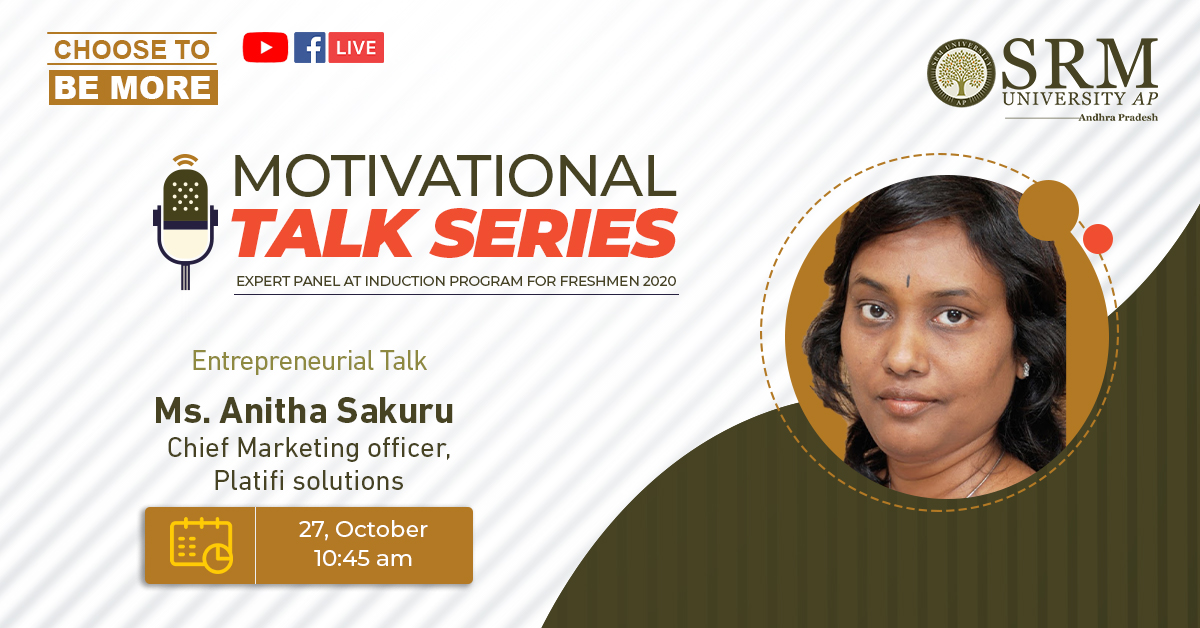 After the success of the entrepreneurial talk by Ms Anita Sakuru in the first edition of the Orientation Programme 2020, Ms Anita Sakuru has been earnestly requested by SRM University-AP, Andhra Pradesh to inspire and enlighten the audience in the 2nd Orientation Programme 2020. Ms Anita Sakuru will be conducting the session with the Freshmen 2020 on October 27, 2020, at 10.45 a.m. Ms Sakuru is prominently known for her flair for entrepreneurship and innovation. She is the co-founder of Pragma Inc, an IT consulting firm founded in 1995. She served as an Executive Vice President for Kenexa and was instrumental in the IT transformation of the company. She has produced and judged a startup show on TV5 named Startup Junction. In addition, Ms Sakuru, is currently a chapter head for 50k ventures, a network that funds startups.
After the success of the entrepreneurial talk by Ms Anita Sakuru in the first edition of the Orientation Programme 2020, Ms Anita Sakuru has been earnestly requested by SRM University-AP, Andhra Pradesh to inspire and enlighten the audience in the 2nd Orientation Programme 2020. Ms Anita Sakuru will be conducting the session with the Freshmen 2020 on October 27, 2020, at 10.45 a.m. Ms Sakuru is prominently known for her flair for entrepreneurship and innovation. She is the co-founder of Pragma Inc, an IT consulting firm founded in 1995. She served as an Executive Vice President for Kenexa and was instrumental in the IT transformation of the company. She has produced and judged a startup show on TV5 named Startup Junction. In addition, Ms Sakuru, is currently a chapter head for 50k ventures, a network that funds startups.
- Published in Events, Uncategorized, Webinars
Dr Lakhveer Singh expounds alternate energy sources
“The Role of Conductive Nanoparticles in Anaerobic Digestion: Mechanism, Current Status, and Future Perspectives” published in the Chemosphere Journal discusses in detail the application of conductive nanoparticles to enhance the AD process efficiency and the interaction between microbes in anaerobic conditions for electron transfer with the help of CNPs. Application of a variety of conductive nanomaterials as an additive is discussed with their potential biogas production and treatment enhancement in the anaerobic digestion process. The Impact factor of the journal is 5.77.
DOI: https://doi.org/10.1016/j.chemosphere.2021.130601
The said research project has been carried out under the scheme of “Mentoring of Engineering Teacher by an INAE Fellow”, financially supported by the Indian National Academy of Engineering. The work goes forward in close collaboration with Pulsed Power & Electromagnetic Division, Beam Technology Development Group, Bhabha Atomic Research Centre (BARC)-Vishakhapatnam.
The future projects of Dr Tewari involve working on simulations related to the compact IEC for study, analysis, optimization of different parameters of an IEC system and related experimentation in collaboration with BARC.
- Published in Uncategorized
An invited lecture on technologies for connected vehicles
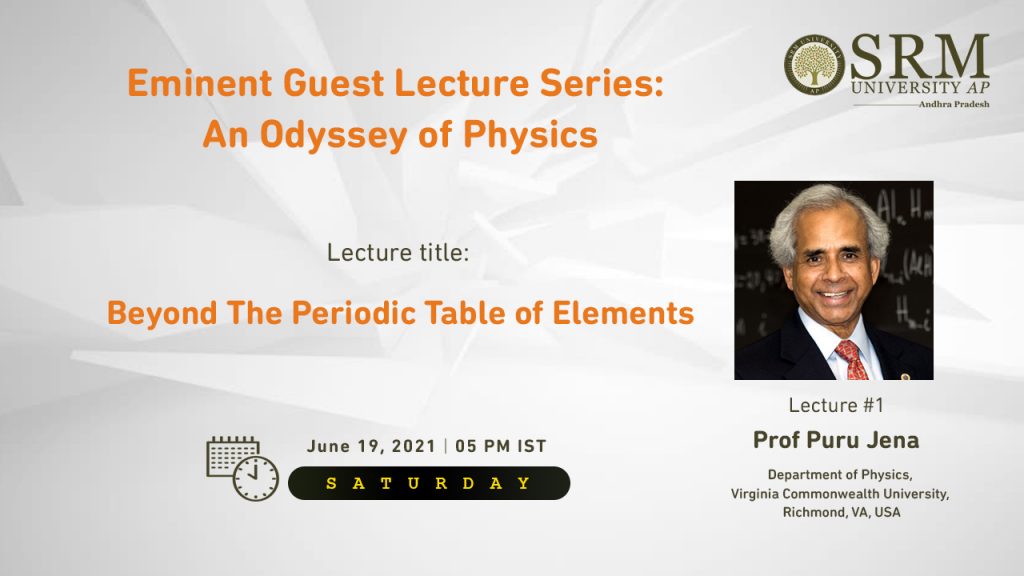 An invited lecture, “Technologies for Connected Vehicles”, will be organized by the Department of Electrical and Electronics Engineering (EEE), SRM University-AP, Andhra Pradesh, on June 19, 2021, at 11.00 am. In this online session, Dr Ramani Kalpathi, guest faculty at BITS Pilani, will give an introduction to intravehicle networks with a focus on CAN, LIN, Flexray, MOST, Ethernet, and Bluetooth networks introducing the frame formats, sample hardware implementation, and SAE formats.
An invited lecture, “Technologies for Connected Vehicles”, will be organized by the Department of Electrical and Electronics Engineering (EEE), SRM University-AP, Andhra Pradesh, on June 19, 2021, at 11.00 am. In this online session, Dr Ramani Kalpathi, guest faculty at BITS Pilani, will give an introduction to intravehicle networks with a focus on CAN, LIN, Flexray, MOST, Ethernet, and Bluetooth networks introducing the frame formats, sample hardware implementation, and SAE formats.
Dr Ramani Kalpathi is the founder of Powersoft Systems and The ARM Academy. He earned his PhD in Electrical Engineering from Texas A&M University, USA, and M.S in Electrical Engineering from IIT Madras. The use of Wifi and IoT technologies and their presence for ubiquitous networks with typical samples of synchronous messages will be presented for connected technologies during the lecture. Implementation of Electic vehicles and the need for continuous data monitoring for autonomous vehicles may also be discussed for the purpose of diagnostics and reliability.
All interested B.Tech, M.Tech, and PhD students from any university are welcome to join the lecture upon registration.
Registration Link: https://srmap.zoom.us/webinar/register/WN_bbU84N2NT7mVx7qRK0DbFw
Know more about Prof Jena: https://physics.vcu.edu/jenasgroup/
- Published in Uncategorized
SRM University to enhance research collaboration
Pioneer – May 08
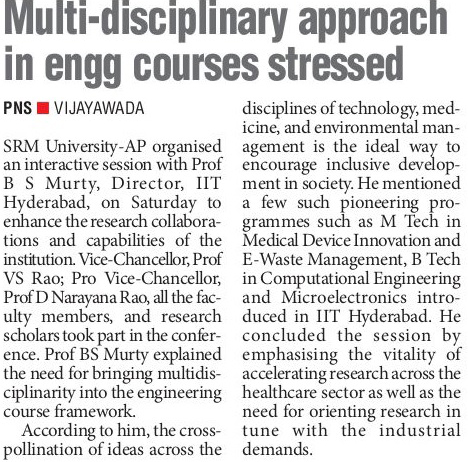
Hans India – May 08
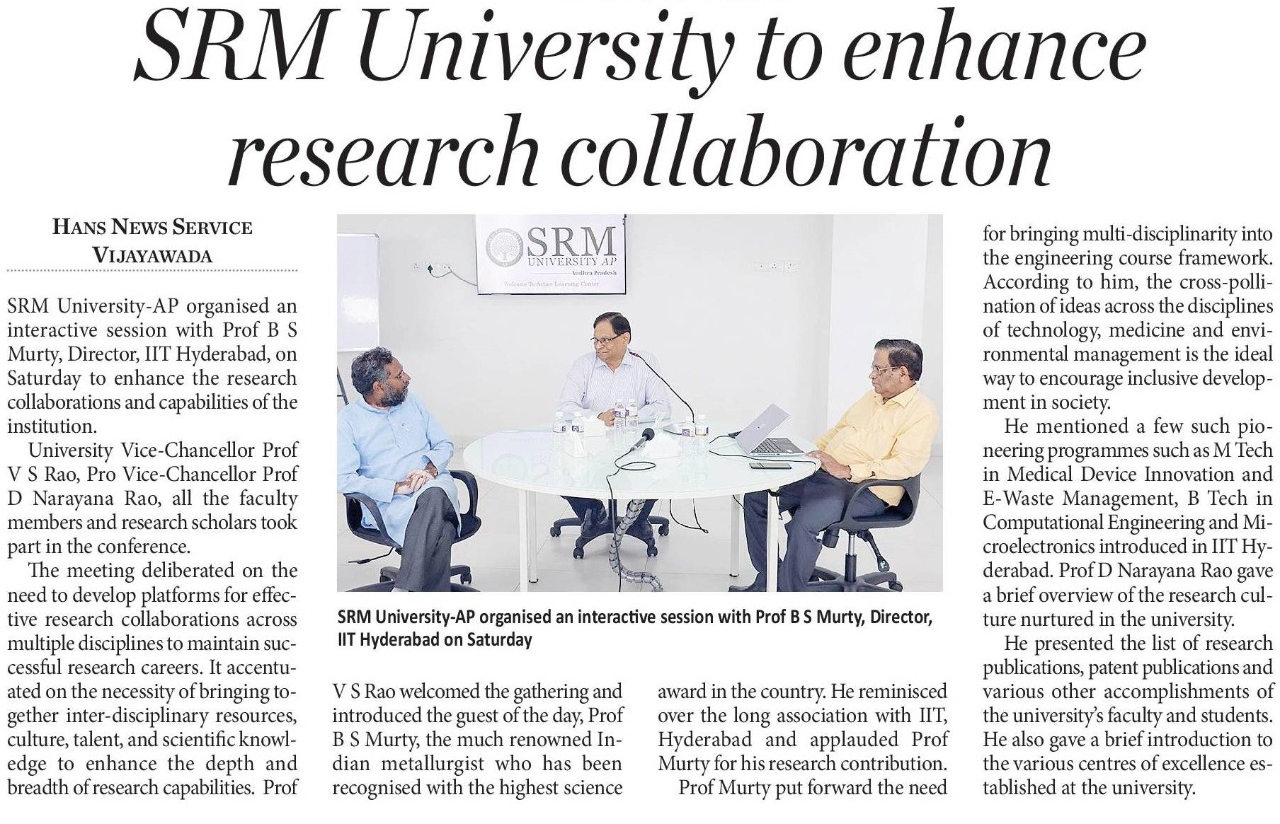
- Published in Uncategorized
- 1
- 2

